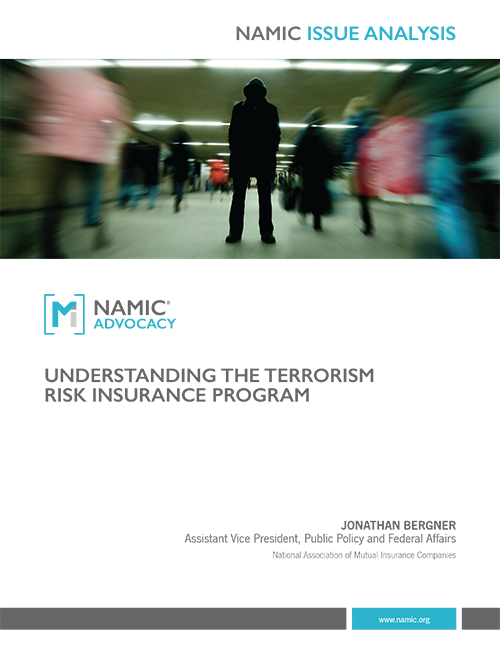Our Positions | Terrorism Risk Insurance Act (TRIA)
Following 9/11, Congress recognized the unique challenges of insuring commercial enterprises against terrorist attacks and passed the Terrorism Risk Insurance Act, or TRIA, in November of 2002. TRIA established a risk-sharing mechanism for certain commercial lines that allows the federal government and the insurance industry to share losses in the event of a major terrorist attack. The program was designed to ensure that adequate resources are available for businesses to recover and rebuild if they become the victims of a catastrophic terrorist attack.
The key elements of the program include:
Required Offering of Terrorism Coverage: The current program requires all insurers selling covered lines to offer terrorism coverage, compelling many insurers that had previously exited that market to return, dramatically reducing the amount of potentially uninsured losses in the event of a future attack. Insurers are required to offer coverage for acts of terrorism on the same terms and conditions as other coverages, although this does not include coverage for nuclear, biological, chemical, and radiological-attacks.
Certified Act of Terrorism: To involve the TRIA program, an individual act of terrorism must be certified by the secretary of the Treasury in consultation with the secretary of Homeland Security and the U.S. attorney general. To be a certified act, losses must exceed $5 million.
Program Trigger: Best conceived of as a “light switch,” the TRIA program is “switched on” only if the insurance industry’s aggregate insured losses exceed $200 million in a given year. Once “on” the trigger level has no bearing on the federal government’s share of the losses in a specific event.
Deductible: Each insurer is responsible for paying out a portion of its claims – the “deductible” or “individual company retention level” – before any federal involvement. An insurer’s deductible equals 20 percent of an insurer’s annual direct earned premiums from the year prior to a certified event from covered TRIA lines. For some companies, these deductibles are in the billions of dollars.
Co-Share: For each insurer’s losses above its deductible, the insurer covers 20 percent and the federal government covers 80 percent until the amount of losses totals $100 billion, after which there is no requirement that insurers or the government provide coverage.
Mandatory Recoupment: By law, the federal government must recoup the difference between insurers’ total costs and the industry aggregate retention level, which is calculated as the sum of all the individual company deductibles estimated to be approximately $46 billion for 2020. This recoupment takes place in the years following the federal sharing of insurer losses, with the Treasury Department establishing surcharges on all covered commercial policies and is required to recoup 140 percent of the initial outlays to insurers under the program. This mandatory recoupment will not apply for losses above the industry aggregate retention level. In that case, however, the Treasury secretary retains discretionary authority to apply recoupment surcharges for all losses above this level. Ultimately, every dollar spent by the federal government is recoupable under current law.
Since its initial enactment in 2002, the Terrorism Risk Insurance program has been revised and extended multiple times. The current extension will expire on Dec. 31, 2027.
Issue Analysis Papers
Understanding the Terrorism Risk Insurance Program (PDF)
Since the events of September 11, 2001, the federal government has developed a robust and sophisticated counter-terrorism apparatus that has thus far succeeded in preventing large-scale terrorist attacks on the United States homeland. However, the threat of terrorism is continuing to evolve amid a changing, unstable, and dangerous international environment. This paper explores the TRIA program, a risk-sharing model between insurers, policyholders, and the federal government that has acted to create space for a robust private market for terrorism insurance to form where it would not have otherwise.
(Published 03/26/19)


